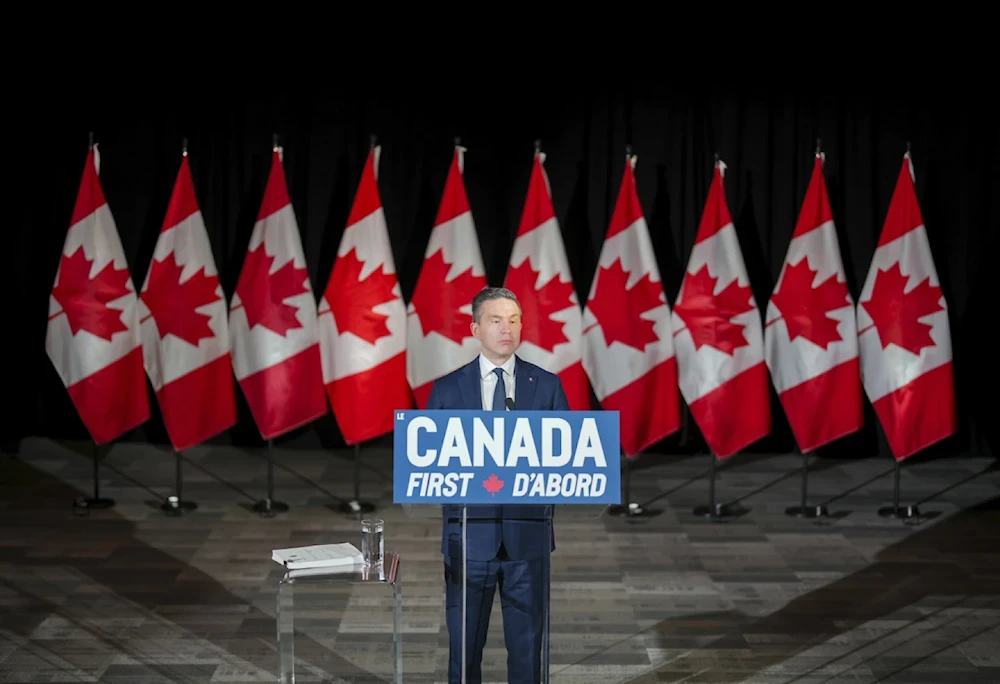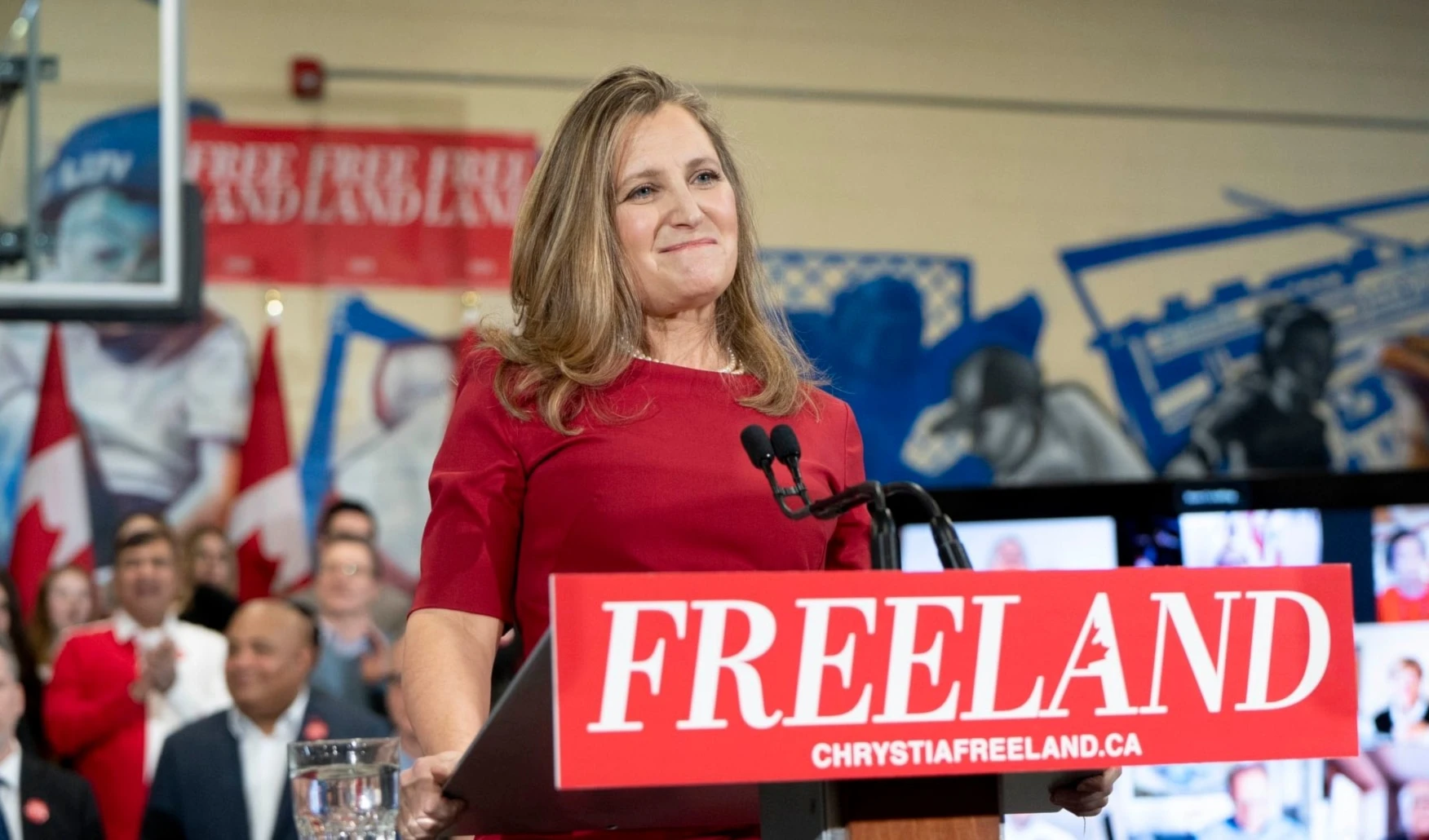Wealthy conservative voters more likely to leave Canada, fear election
Amid a potential fourth consecutive defeat, 34% of wealthy Conservative voters are considering leaving Canada, citing economic concerns and declining quality of life.
-
 Conservative leader Pierre Poilievre speaks during a news conference in Ottawa, March 14, 2025 (Chris Tanouye/The Canadian Press via AP)
Conservative leader Pierre Poilievre speaks during a news conference in Ottawa, March 14, 2025 (Chris Tanouye/The Canadian Press via AP)
A growing number of the Canadian Conservative Party's wealthy millionaires are considering relocating, as the political party faces the possibility of a fourth consecutive election defeat, something not as prevalent among their Liberal peers.
A survey released by investment migration consultancy Arton Capital Ltd. revealed that 34% of Canadian millionaires, defined as individuals with a net worth of at least C$1 million ($721,000), who voted Conservative said they are now more likely to consider leaving Canada compared to during the last federal election in 2021, while 28% reported they are less likely to leave. In contrast, only 23% of Liberal-voting millionaires said they’re more likely to leave now, and 35% said they’re less inclined to do so.
In total, 28% of the 1,000 millionaires between 18 to 70 years old said they’re more likely to leave Canada now than four years ago. They cited a decline in quality of life and a negative economic outlook as the main reasons.
Armand Arton, CEO of the firm, believes the growing interest in leaving Canada among wealthy Conservative supporters stems from recent polls pointing to a potential Liberal majority in the April 28 election, which would push the party’s hold on power past the ten-year mark.
Arton Capital, which was founded in 2006 to help millionaires come to Canada, now helps more to move out. So far this year, the Montreal-based firm has helped just two high-net-worth families immigrate to Quebec, Arton said.
'Most important elections in Canadian history'
Earlier this month, a new Nanos poll showed that 86% of Canadians view the upcoming federal election, marked by rising US tariffs, sovereignty concerns, and shifting party dynamics, as the most important in the country’s history.
“The Conservatives are willing to leave because if the Liberals stay with the same trajectory, that’s something against their values, their principles,” Arton said in an interview.
“I have a plan B; I don’t have to stay where I am if I’m not happy,” he further commented, adding that dozens of countries are trying to attract wealthy individuals.
Arton Capital also saw a wave of wealthy Americans seeking to leave the US after an increasingly polarized US Presidential election last November, choosing "more hospitable" nations, such as Portugal, Malta, Spain, Greece, and Italy.
A wave of wealthy Americans is eyeing a move to Europe after Trump's win.
— Arton Capital (@ArtonCapital) November 22, 2024
Read the full article on @CNNBusiness to explore how political and social divides are fueling the demand for second residencies.@armandarton #GoldenVisas #GlobalCitizenship #MobilityMatters #USPolitics… pic.twitter.com/d331u6yRHS
For wealthy Canadians, Australia, the US and New Zealand were their three most desired destinations, according to the survey conducted by Arton Capital Ltd. from April 9 to 17.
Had the polling been done before US President Donald Trump’s tariff threats, the US would have probably been their top destination, Arton said.
Canadians set to vote
With the election just days away, the Liberals are holding a modest edge over the Conservatives in the polls, roughly a four-point lead on average. Data from polling aggregator 338 Canada suggests they currently have around a 70% likelihood of securing a majority in Parliament.
January 5, 2025
— Philippe J. Fournier (@338Canada) March 25, 2025
vs
March 25, 2025https://t.co/IQaKoGJaEl pic.twitter.com/XNHyD08RfQ
The voting preferences of millionaires surveyed by Arton Capital align with general polling trends, showing the Liberals ahead of the Conservatives. The Liberals are particularly favored by women and individuals aged 65 and older, while younger millionaires tend to support the Conservatives.
Canada has faced a wave of controversy over the last few months. In January, Canadian Prime Minister Justin Trudeau announced he would step down as leader of the Liberal Party after nine years in office, citing internal party pressure. Trudeau, who had served since 2015 and secured reelection twice, acknowledged his declining popularity.
This was followed by an embarrassing set of remarks from the then newly sworn-in US President Donald Trump, when he said, "many people in Canada LOVE being the 51st State. The United States can no longer suffer the massive Trade Deficits and Subsidies that Canada needs to stay afloat. Justin Trudeau knew this, and resigned."
Conservatives have criticized the Liberals for high taxes, excessive spending, and poor fiscal management. They also blame the party for mishandling the housing crisis and inability to manage the rising cost of living, particularly in Vancouver and Toronto, citing policies that increase demand without addressing supply shortages. Additionally, taxes and regulations on developers have slowed construction, worsening affordability for many, especially younger Canadians.

 4 Min Read
4 Min Read










